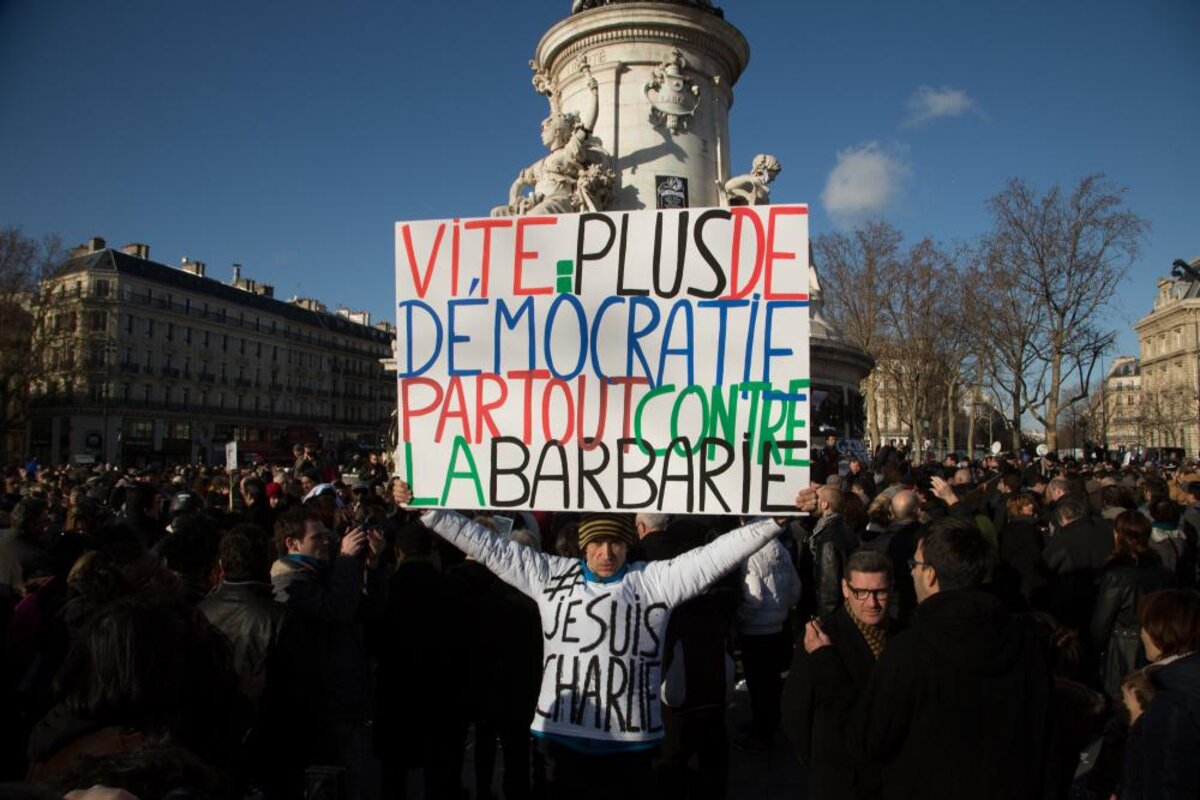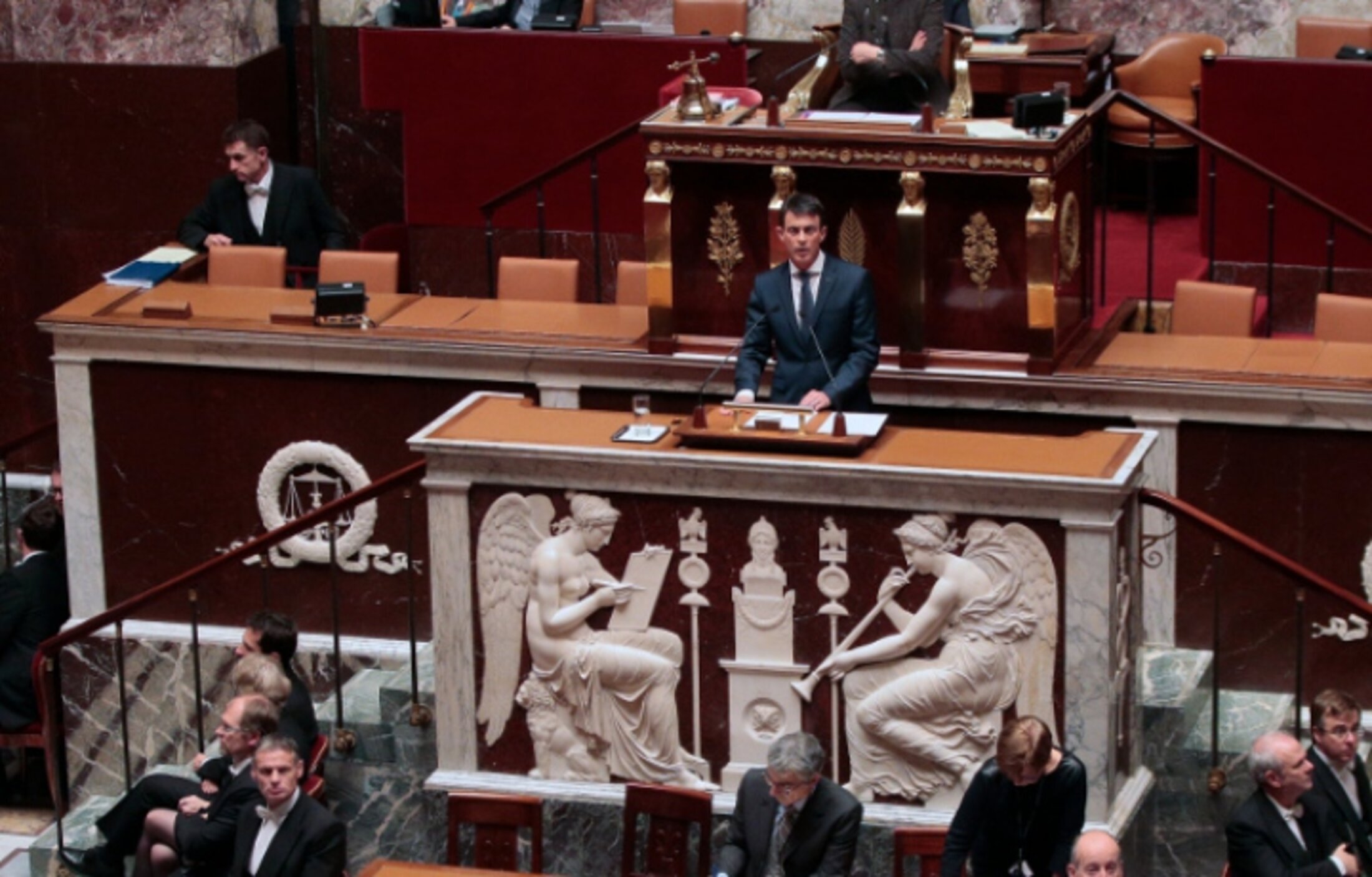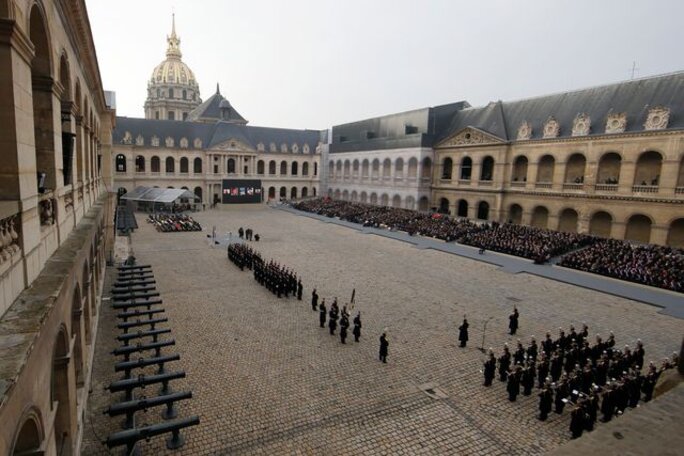Two weeks after the Paris terror attacks of November 13th, the face of France's Fifth Republic has radically changed. It has now taken on the hideous visage of fear, a clamour for war, of a government out of control. This is a long way from the “spirit of January 11th” celebrated in the mass marches that took place following the attack on Charlie Hebdo magazine and the anti-Semitic attack on a Jewish supermarket in east Paris.
On that day, Sunday January 11th, 2015, French society rose up in mass in one of the biggest demonstrations ever seen since World War II. At Mediapart we called on people to take part, not to celebrate some notion of 'sacred unity', whose political history in France teaches us that it leads to ruin, but rather to pay tribute, first and foremost, to the victims and to be part of that immense citizen awakening which then swamped mere political speeches.

Enlargement : Illustration 1

At the time the ambiguities, discords and contradictions of these gatherings were raised and debated. But at least society was present, in the front line, in all its strength and diversity, sending out a challenge to the entire political class to come up with new responses, ones that did not repeat the tragic errors of the past. For example those committed by the Bush administration in the wake of 9/11. Those were mistakes, moreover, that had been inspired by another political disaster, and a French one this time: namely the special powers granted to French prime minister Guy Mollet in 1956 and the way the Fourth Republic was engulfed by the Algerian War. It should be recalled that advisors to Donald Rumsfeld, George W. Bush's defence secretary at the time of the Iraq War, had closely studied the Battle of Algiers.
This current French government, which since November 13th seems to consist of just three men, President François Hollande, prime minister Manuel Valls and interior minister Bernard Cazeneuve, has thus learnt and absorbed nothing from past crises that pursue us to this day. The republican disaster in France after the Algerian War, the democratic disaster after 9/11: what more does it take for this government to understand that it is hurtling this country towards a danger zone, where on top of political crises one can add the risk of social explosions?
Just a few months ago, following the Paris attacks of January 7th, two men had set out the issues that were at stake and without doubt helped – along with many others – to curb the government's temptation to carry out a headlong rush on security issues. The first was former justice minister Robert Badinter, who warned at the time: “The terrorists have set us a trap. It's not through laws and emergency jurisdictions that you defend freedom against your enemies.” The second was former prime minister Dominique de Villepin who said: “Let us resist the war mentality. War against terrorism can't be won, there is no exception. You need a political strategy and the ability to think beyond.”
Were they to speak today these two former political leaders would at best be ignored, and at worst be accused of softness, naivety, treachery, irresponsibility...all expressions that when they are not being expressed directly by the government, are uttered by those organs of the media that have donned a uniform and draped themselves in the tricolore flag.
But whether Robert Badinter and Dominique de Villepin like it or not, here is France hurtling forward, involved in war and living under a state of emergency. It is the decision of a weak and worried government, which in this violent headlong rush is trying to save itself by barricading itself inside the state of emergency. The initially-decreed 12-day state of emergency – the limit imposed by the law dating from 1955 – might have been exclusively motivated by security requirements. Supplemented, reinforced and prolonged for three months (or even more some political leaders are already saying) it now has two other functions: to muzzle society by installing on a lasting basis this state of fear that paralyses society; and to ban or at least limit the vital questioning of political decisions made over the years.
Beyond involving the country in a war – a decision that has never been properly discussed and explained – the response to terrorism is thus to put our democracy on hold. After the rule of law comes rule outside the law. It is a decision for which the prime minister accepts responsibility. Doubtless feeling himself squeezed between François Hollande and Bernard Cazeneuve, Manuel Valls has loudly defended the installation of this emergency regime, in his customary role as the government figure who always has to go one step further.
An abandonment of the rule of law signalled to the Council of Europe
Valls did this first of all by asking France's Members of Parliament who were examining the bill extending the state of emergency “not to use legalism” in their deliberations. “Let's move forward!” he asserted, to silence those rare Parliamentarians who were worrying about anti-freedom measures in no way linked to the fight against terrorism. The prime minister did not have to insist too much, so quick was Parliament to give way, including communist MPs, just like the communist MPs who voted in special powers for Guy Mollet in 1956. “Never in the recent past have such serious decisions been approved with such speed by Parliamentarians from both Right and Left,” said the academic Olivier Le Cour Grandmaison (see his blog, in French, on Mediapart here). “Everyone claims to be in control of events; they are simply submitting themselves to them because they are afraid.”

Enlargement : Illustration 2

Later, Manuel Valls took care to warn the same Parliamentarians that they should guard against referring the law on extending the state of emergency to the Conseil Constitutionnel, as the measure would not probably be deemed compatible with the French Constitution. “There are some measures which were voted on by the National Assembly which are fragile in constitutional terms,” Valls told French senators. “If the Conseil [editor's note, the country's top authority on the Constitution] responded that the revised law is unconstitutional on a certain number of points, that could strike down 786 searches and 150 house arrests that have already been made.” Among these points liable to be found unconstitutional would be the measure allowing for the electronic tagging of a person who has been convicted for a terrorism offence and who completed their sentence fewer than eight years ago. Another is a measure allowing associations to be dissolved directly by the state.
In the end, France officially notified the Council of Europe – the body that monitors human rights on the continent - of this abandonment of the rule of law. In a letter to the organisation, the government accepted that it had freed itself of the strictures of the European Convention on Human Rights. This demand to derogate from the convention's obligations is mandatory if a country wants to avoid potential actions before the European Court of Human Rights. The French government in fact accepted that “certain of them [editor's note, measures linked to the state of emergency] are likely to involve a derogation from the [convention's] obligations”.
This state of emergency has established a state out of control. Beyond the flimsy protections of administrative justice, as defined in the new state of emergency legislation, the apparatus of the state is free from all restraint and counterbalance. The past fortnight has already shown this. Unlike normal searches, which require the approval of a judge, state prefects can order 'administrative' or state-ordered searches and house arrests on their own initiative, a practice that has led to considerable zeal on the part of the officials.
“Yes, it's trawling,” agreed one prefect quoted in an investigation by Mediapart's Mathilde Mathieu. Close to 300 people have been put under house arrest and more than 1,600 searches have been carried out since November 13th. Some of those put under house arrest have been people subject to so-called 'S' files, meaning they are classified as a potential risk to national security. But others are organic market gardeners, squatters, activists in associations and climate activists. This broad scope has also allowed police forces to clear up old cases outside the normal judicial process – cases involving drugs, petty crime and more major crimes – and allowed the intelligence services to refine their searches of various groups.
The state apparatus has quickly gone further than the emergency legislation itself authorises. Social movements have been targeted and whole areas have become forbidden zones (as is the case with the Plateau de Saclay, the so-called European Silicon Valley, south of Paris). “The fight against terrorism is here just a pretext to ban any dissident voices. As we feared, the state of emergency is being accompanied by measures that are more and more arbitrary,” France's human rights organisation the Ligue des Droits de l'Homme noted on Friday. “The minister of the interior is losing his nerve, and is confusing and conflating the associative movement with terrorism.”
In a circular on November 25th, revealed by the AEF media agency, the Ministry of the Interior tried to rein back some of the administrative and police zeal that has led to a series of incidents. “It is because the [editor's note, state-authorised] administrative searches in particular infringe people's individual freedoms that police and gendarmes are required to be exemplary,” wrote interior minister Bernard Cazeneuve. But the reasons given to justify the searches remain broad and vague: “serious reason to believe that the place is frequented by people whose behaviour threatens order or public safety”. In other words, something as simple as a person's “behaviour” can lead to their house arrest.
'The enemy within'

Enlargement : Illustration 3

Manuel Valls does not care. Taking responsibility for the new presidential programme outlined before the extraordinary meeting of the French Parliament at Versailles just after the attacks, and which draws to a large extent on the policies of the mainstream right and the extreme right, the prime minister is orchestrating this security hysteria, which worries people more than it reassures. “France will carry out an implacable war”; “eradicate”, “wipe out” Islamic State; “enemy within”; “we're all on the front line”; “this war will be long”; “extraordinary work from the forces of law and order”. As war leader Manuel Valls rejects any questions or hesitation.
For example, any questioning of France's foreign policy or the profound disorganisation of our intelligence apparatus is immediately brushed away: there can be no “culture of excuses”, no “culture of repentance”. While after the January attacks this government appealed to society– though with some reserve – that same society is now told to get in line and commanded to adopt patriotic fervour.

Enlargement : Illustration 4

The result? This caricatural government campaign that aims to reduce our participation in the homage to all the victims of the November 13th to a blue, white and red flag to download and stick on our window, to the injunction to “Take a selfie in blue, white and red” and to write a Twitter thought in 140 characters with the hashtag #FiersdelaFrance ('Proud of France'). The abrupt and shocking nationalisation of a grief shared by society makes one question the ulterior motives of a government that is on the run. “I am appalled by the state control of emotion, by its appropriation by the very people whose political destiny hangs on its permanent manipulation,” says Philippe Aigrain, one of the senior figures in the internet freedom campaign group La Quadrature du Net.
This hasty construction of an emergency regime will not sort out the security problem. No more than the ten laws passed since 2001 aiming to fight terrorism have done. Our freedoms threatened by the arbitrariness of the state, our democracy put in quarantine, the removal of political reference points in a country plagued by the extreme right … these decisions will lead to other crises. In 1955 the state of emergency that was declared was quickly judged to be insufficient. The powers of the police and army had to be broadened again and again; resulting, a year later, in the granting of special powers. In doing this, Guy Mollet, the socialist president of the ruling council, signalled the destruction of the Fourth Republic, and with it the dishonour of the French Left. François Hollande and Manuel Valls are heading in the same direction.
-----------------------------------------------------------------------
- The French version of this article can be found here.
English version by Michael Streeter


